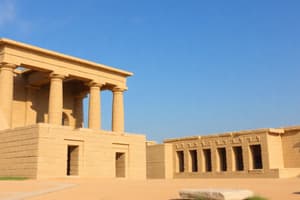Podcast
Questions and Answers
What was the significance of the Code of Hammurabi in ancient Mesopotamia?
What was the significance of the Code of Hammurabi in ancient Mesopotamia?
It was a comprehensive set of laws that governed the Babylonian Empire, establishing a uniform code of justice.
What was the main purpose of the pyramids in ancient Egypt?
What was the main purpose of the pyramids in ancient Egypt?
They were elaborate tombs for pharaohs, believed to provide a means for the pharaohs to ascend to the afterlife.
What was the significance of the city-state in ancient Greece?
What was the significance of the city-state in ancient Greece?
It was a self-governing entity that allowed for the development of democracy and the pursuit of philosophical and artistic achievements.
What was the impact of the Roman Empire's expansion through conquests?
What was the impact of the Roman Empire's expansion through conquests?
What was the role of Confucianism in ancient China?
What was the role of Confucianism in ancient China?
What was the significance of cuneiform writing in ancient Mesopotamia?
What was the significance of cuneiform writing in ancient Mesopotamia?
What was the role of pharaonic dynasties in ancient Egypt?
What was the role of pharaonic dynasties in ancient Egypt?
What was the significance of the development of democracy in ancient Greece?
What was the significance of the development of democracy in ancient Greece?
What was the impact of ancient Rome's contributions to engineering?
What was the impact of ancient Rome's contributions to engineering?
What was the significance of the invention of the Silk Road in ancient China?
What was the significance of the invention of the Silk Road in ancient China?
What was the role of philosophers in ancient Greece?
What was the role of philosophers in ancient Greece?
Flashcards are hidden until you start studying
Study Notes
Ancient Civilizations
Mesopotamia
- Located in the Fertile Crescent (modern-day Iraq and parts of Syria, Turkey, and Iran)
- Emerged around 4500 BCE
- Known for:
- Invention of writing (cuneiform)
- Development of cities (e.g. Babylon, Ur)
- Creation of laws (Code of Hammurabi)
- Advances in agriculture, architecture, and governance
Ancient Egypt
- Located in northeastern Africa
- Emerged around 3100 BCE
- Known for:
- Pyramids of Giza (Khufu, Khafre, Menkaure)
- Hieroglyphic writing system
- Mummification and afterlife beliefs
- Pharaonic dynasties (e.g. Old Kingdom, New Kingdom)
Ancient Greece
- Located in southeastern Europe
- Emerged around 8th century BCE
- Known for:
- City-states (e.g. Athens, Sparta)
- Development of democracy
- Philosophers (e.g. Socrates, Plato, Aristotle)
- Theater and the arts (e.g. tragedy, comedy)
Ancient Rome
- Located in central Italy
- Emerged around 8th century BCE
- Known for:
- Republic and imperial systems of government
- Development of law and architecture
- Expansion through conquests (e.g. Roman Empire)
- Contributions to language, literature, and engineering
Ancient China
- Located in eastern Asia
- Emerged around 1600 BCE
- Known for:
- Dynasties (e.g. Qin, Han, Ming)
- Development of Confucianism and Taoism
- Inventions (e.g. paper, gunpowder, Great Wall)
- Imperial systems of government and administration
Ancient India
- Located in southern Asia
- Emerged around 1500 BCE
- Known for:
- Indus Valley Civilization
- Development of Hinduism and Buddhism
- Caste system and social hierarchy
- Contributions to mathematics, medicine, and philosophy
Ancient Civilizations
Mesopotamia
- Located in the Fertile Crescent, which includes modern-day Iraq and parts of Syria, Turkey, and Iran
- Emerged around 4500 BCE
- Invented writing in the form of cuneiform
- Developed cities, such as Babylon and Ur
- Created the Code of Hammurabi, a set of laws
- Made significant advances in agriculture, architecture, and governance
Ancient Egypt
- Located in northeastern Africa
- Emerged around 3100 BCE
- Built the Pyramids of Giza, including the pyramids of Khufu, Khafre, and Menkaure
- Developed a hieroglyphic writing system
- Believed in mummification and an afterlife
- Had a system of pharaonic dynasties, including the Old Kingdom and New Kingdom
Ancient Greece
- Located in southeastern Europe
- Emerged around the 8th century BCE
- Developed city-states, such as Athens and Sparta
- Created the concept of democracy
- Produced famous philosophers, including Socrates, Plato, and Aristotle
- Made significant contributions to theater and the arts, including tragedy and comedy
Ancient Rome
- Located in central Italy
- Emerged around the 8th century BCE
- Developed a system of government that transitioned from a republic to an empire
- Made significant contributions to law and architecture
- Expanded its territory through conquests, creating the Roman Empire
- Contributed to language, literature, and engineering
Ancient China
- Located in eastern Asia
- Emerged around 1600 BCE
- Had a series of dynasties, including the Qin, Han, and Ming
- Developed Confucianism and Taoism
- Invented paper, gunpowder, and the Great Wall
- Developed an imperial system of government and administration
Ancient India
- Located in southern Asia
- Emerged around 1500 BCE
- Had the Indus Valley Civilization
- Developed Hinduism and Buddhism
- Had a system of social hierarchy, including the caste system
- Made significant contributions to mathematics, medicine, and philosophy
Studying That Suits You
Use AI to generate personalized quizzes and flashcards to suit your learning preferences.




